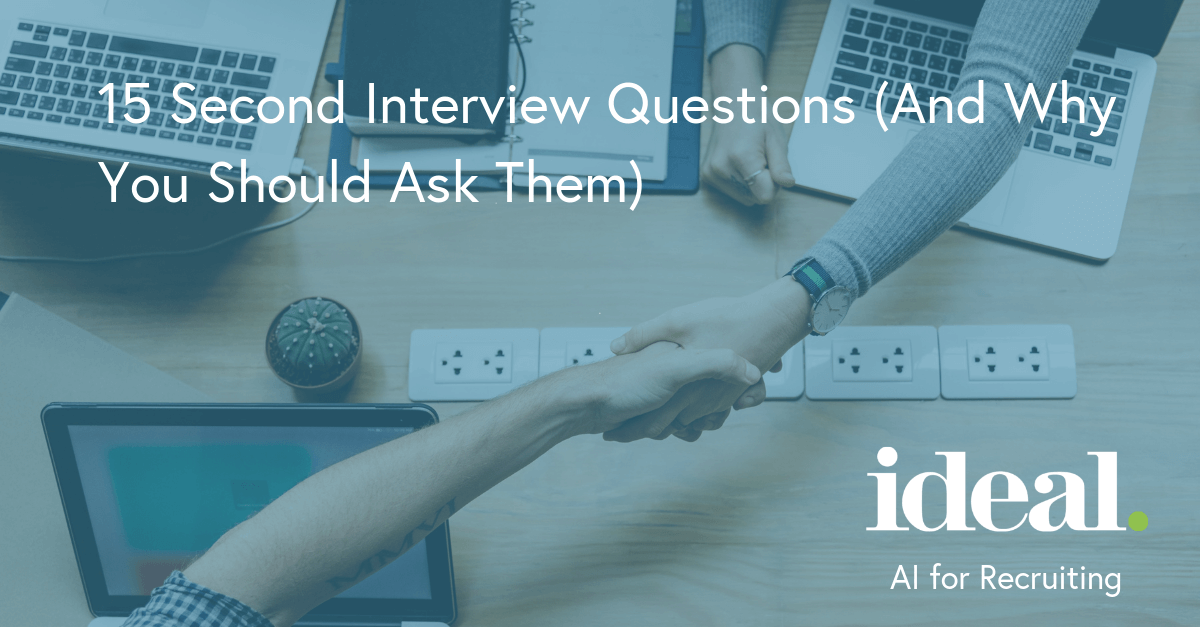
Second interviews are not just a formality, they are an essential way to really understand how your candidate ticks and whether they are the right choice for the job. These 15 second interview questions will help you select the cream of the crop of talent available to you and can make it much easier to choose between equally matched candidates.

What’s the point of a second interview?
Second interviews have a very different dynamic to first interviews. You’ve already established the candidate could be good for the job. You know their background is broadly relevant, they seem to have good interpersonal skills, they come across well in person, etc. In short, you like them, you think this could work. Everyone who comes back for a second round of interviews is on a similar level. So with this round of questions, you need to go much deeper to truly find out how they will fit in with your organisation.
Also, a lot of time may have passed between the first and second interviews. You need to assess if anything has changed for your candidates, especially if they’ve met with other companies in the interim. A second interview is not just to find out if a candidate is really cut out for the job, it can also be used to sell them on your company, and ensure that quality talent isn’t being tempted away by the competition.
Types of second interview questions
Second interviews are your chance to drill down into some of these crucial factors:
- Competency
- Technical ability
- Problem-solving
- Company fit
- Emotional intelligence
In this post, we’ll take a look at a range of second interview questions from each category and why you should ask them.
Competency
These sorts of questions help you find out how your candidate deals with real-life work challenges. You can’t see your candidate in action in the workplace before you hire them, so make sure you ask questions that are open-ended and let them talk.
Q#1: Can you talk about a time when you had to make a split second decision? What was the outcome?
This goes beyond simply asking candidates to describe their competencies to you in the abstract. Like all good second interview questions, it is designed to make the candidate think. They don’t have to immediately come up with an answer. In fact, it’s good if they’re not trying too hard to impress you by answering every question quickly. The important thing is, do they take the time to conscientiously answer your question? Are they explaining a practical solution they came up with, or are they just boasting about their supposed leadership skills? This question will help get to the heart of the matter.
Q#2: What’s the biggest work problem you’ve had to deal with recently?
Second interview questions should be structured so that it’s hard for the candidates to have a predefined set of answers to rely on, they should be about getting them to think and respond in a natural and thoughtful way to your questions rather than reiterating a rehearsed answer. These kind of second interview questions are a test of how candidates react in the moment. This is a specific question and it requires a very specific answer, not generalities. If the candidate lucidly explains a tricky work problem and demonstrates that they had a significant role in solving a problem you will be more comfortable that they will be able to deliver on the promise of their first interview performance.
Q#3: What would you do if you were assigned multiple projects with the same deadline?
This question will demonstrate how your candidate manages time and priorities; whether they have a realistic approach to this, or if they’re just trying to tell you the answer they think you want to hear. You want to see that they take ownership of these situations. Do they negotiate extensions, make excuses, find innovative solutions, take initiatives etc?
Technical ability
CVs can look very impressive, but how do you really get to see your candidate’s skills in action? Well, you can get very close to this effect by asking questions to dig deeper into their skill levels and resourcefulness.
Q#4: What were your responsibilities on your most recent work project?
Again, this is not a question that can be faked because it requires a specific answer with a recent example. It will give you an idea of the scope and applicability of the candidate’s technical abilities.
Q#5: Based on the description of this role, what do you imagine you will be doing on a daily basis?
The second interview isn’t just about finding out about the candidate’s skills, it’s about testing the water in terms of how motivated they are to work for your company, and how fully they are thinking about how they will go about delivering on their responsibilities. If they have taken the time to talk practically about what their workflow might look like on a daily basis (even if it’s wrong) then they are clearly someone who gives thought to their work and treats their roles seriously. It will give you an idea for how good a fit they will be and whether they have a good understanding of what their potential new role might entail.
Q#6: What are your IT strengths and weaknesses?
This is a ‘brass tacks’ question that gets to the heart of your candidate’s technical abilities. It will show them where they are aligned with the technical aspects of the role and give you an idea of where there is room for development. If one of the skills they lack is easily trainable and they have a strong aptitude in other areas, it shouldn’t be a problem. If they lack in a crucial area that’s very complex you may need to re-evaluate whether they are right for the role.
Problem-solving skills
The questions above will already have given you a good understanding of your candidate’s technical abilities. But now it’s time to get a handle on how strong their abstract problem-solving skills are. These second interview questions will help you ascertain how the candidate copes when things don’t go to plan.
Q#7: Tell me about a time when you realised a colleague had made a mistake. How did you deal with this and what was the outcome?
This is an opportunity to see how conscientious and forward thinking your candidate is and an opportunity to see their diplomatic side. If they are hypercritical of the person who made the error this night indicate that they aren’t a great team player. The trick here is for the candidate to answer this question without selling their former colleague down the river. It will also show you how flexible the candidate is when it comes to solving problems that aren’t their responsibility and possibly aren’t even part of their skill set. It shows their willingness to go beyond the call of duty for the good of the collective goals of your team.
Q#8: Tell me about the biggest work-related problem you have faced. How did you deal with it?
This is another excellent question to get your candidate’s grey cells working. It requires them to reveal what their expectations are for workplace challenges. If they’ve coped successfully with high-stakes situations this is good news that they may well be an essential part of your team. If not it might mean they’ve never really been challenged much by a role and you’ll have less of an idea of how they cope with tricky situations.
Q#9: Tell me about a time where you were caught off-guard by a problem that you had not foreseen? What happened?
Again, the candidate won’t be able to give a polished answer about how they’ve always been ahead of the curve, because this question forces them to think about times when they weren’t prepared for a situation… and how they handled it.
Company fit
Your candidate could be the most skilled person in the room, but that doesn’t mean they’ll automatically be the best fit for your company. If you have a choice between two equally qualified candidates these questions can be a really useful way to find out which candidate will work best with your company.
Q#10: Can you describe the type of work environment or culture in which you are the most productive and happy?
The good thing about this question is that it’s framed in a positive and constructive way and it will help you understand from your candidate’s point of view what their expectations are for the role, and the extent to which they will be met by your work environment.
Q#11: Describe the management style that will help you deliver your best work performance.
Management style is a big part of company culture, and management styles can vary a lot from manager to manager. Your candidate may be used to working under a very hands-on manager and not be prepared to work under someone who takes a more hands-off approach.
If it seems there is a disconnect, explain how your work culture operates and ask if they think they would fit into an environment like that.
Q#12: What is the most important factor you must have in your work environment for you to be successfully and happily employed?
Just because you may have a different work culture to the one your candidate is used to doesn’t mean they won’t fit in with your company. But there may be factors that are essential to their performance and a second interview is a good place to pin down the little details that could determine how well your candidate is suited to the role.
Emotional intelligence
Emotional intelligence is often overlooked as a factor in the interview process, but it can be make-or-break in terms of how well someone performs in your team.
Q#13: Tell me about a time when understanding someone else’s perspective helped you accomplish a task or resolve an issue.
In the first interview, it will have been taken up with encouraging the candidate to talk about themselves, how they do things, and how lucid they are about their own abilities and aptitudes.
Ask this question in a second interview to see how the candidate thinks about other people and what evidence there is that they can relate well to others and perform well in a team.
Q#14: Have you ever noticed that someone at work was having a bad day? How did you know? What did you do?
This scenario may seem too minor to include in a first round interview but it’s a really interesting and illuminating question to ask in a second interview.
It’s not a question that many candidates will be expecting and it will encourage them to think on the spot and come up with a thoughtful answer. It will show you if they have the generosity of spirit to help boost the morale of their fellow colleagues.
Q#15: How would you handle a coworker who constantly doesn’t pull their weight on group projects?
Emotional intelligence isn’t just about generosity, it’s also about how to motivate colleagues who are underperforming. You want to see how they solved this problem assertively and effectively whilst ruffling as few feathers as possible.
You can start on Monday
These are some of the most illuminating questions you can ask a candidate in a second interview. They will help you get a three-dimensional idea of who is the best suited to your vacancy. Some may be more relevant to you than others, and you should use your intuition to judge which are the most relevant for each candidate. But they are guaranteed to make it much more likely you will make the hiring choice which is the best for your company.
Ian Naylor is the founder and CEO of AppInstitute, one of the world’s leading DIY app builders (over 70,000 apps built). Naylor has founded, grown and sold 4 successful internet and technology companies during the past 18 years around the world.
AppInstitute regularly provides leading publications with app analytics, business data, case studies, white papers and statistics for established publishers across the world. They were named in the top 50 creative companies in England by Creative England.



